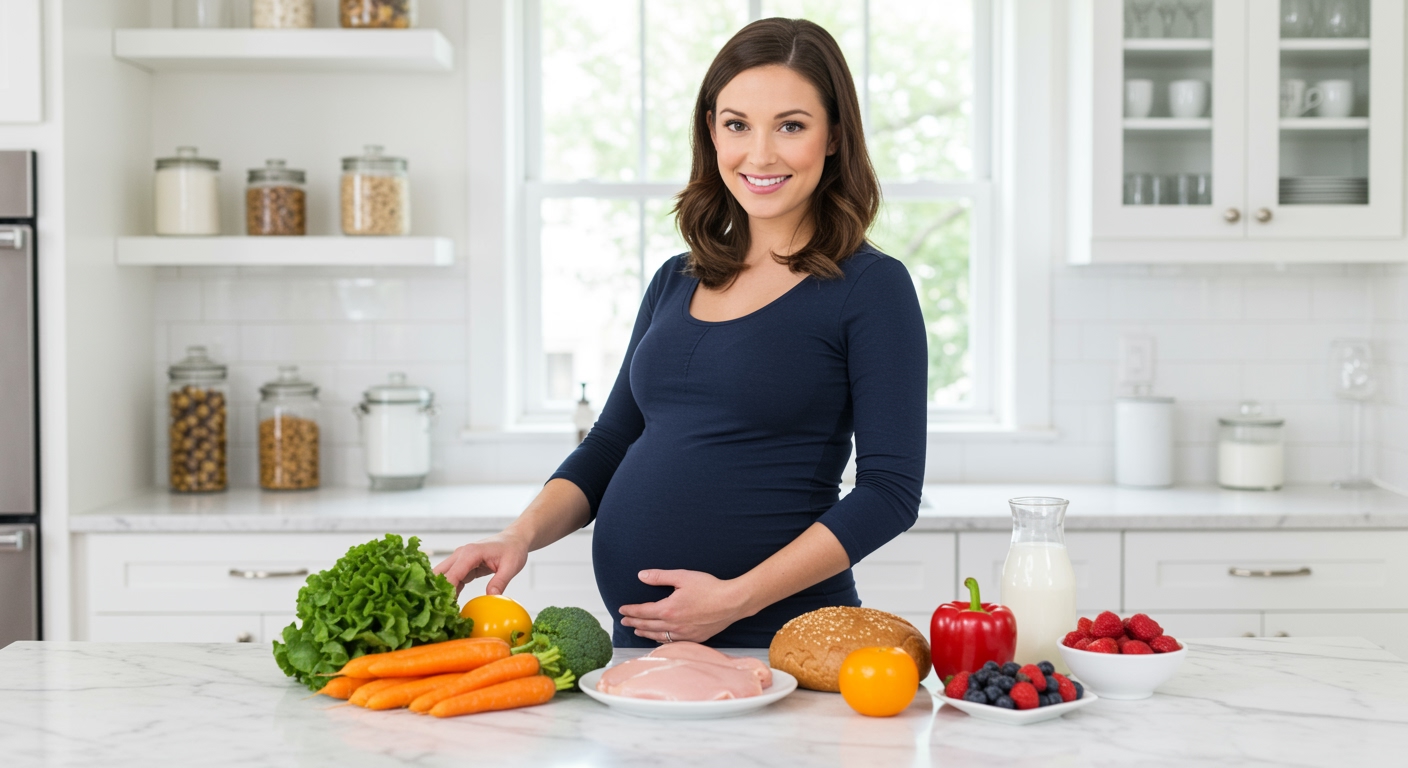✪ Key Highlight: Pregnant women eating diverse foods reduce their child’s eczema risk through beneficial gut bacteria changes.
Introduction
Your pregnancy diet choices today could determine whether your child develops painful, itchy eczema tomorrow.
A groundbreaking new study published in Pediatric Allergy and Immunology reveals that pregnant women who eat from a wider variety of food groups dramatically reduce their children’s risk of developing eczema in early childhood.
Hi, I’m Abdur, your nutrition coach and today I’m going to analyze this important research that followed 677 mother-infant pairs and discovered how maternal dietary diversity creates protective changes in infant gut bacteria.
What Did This Pregnancy Diet Study Actually Find?
Researchers followed pregnant women from Taiwan for three years to track how their food choices affected their children’s skin health.
They used the Minimum Dietary Diversity for Women guideline to measure how many different food groups each mother included in her daily meals.
This guideline checks whether mothers eat foods from major groups like whole grains, proteins, dairy products, fruits, and vegetables.
The scientists then examined the babies’ gut bacteria at two months old and monitored the children for eczema symptoms until age three.
Mothers who ate from the broadest range of food groups had children with significantly lower eczema rates compared to mothers with limited dietary variety.
This protective effect remained strong even after researchers accounted for other factors that might influence a child’s eczema risk.
✪ Fact: Previous research found eating more than 53 different foods during pregnancy lowered moderate eczema risk by 43 percent.
How Does Pregnancy Diet Change Baby Gut Bacteria?
The study revealed fascinating connections between what mothers eat and which bacteria colonize their babies’ digestive systems.
While maternal diet did not change the overall bacterial diversity in infant guts, it significantly altered which specific bacterial species were present.
Two beneficial bacteria types called Rothia and Parabacteroides were much more common in babies whose mothers had diverse diets.
These specific bacteria were directly linked to lower eczema risk in the children as they grew older.
Mothers who ate plenty of vitamin A-rich fruits and vegetables like carrots, sweet potatoes, and leafy greens had babies with higher Parabacteroides levels.
This suggests that certain nutrients in maternal diet help shape the infant immune system in ways that protect against allergic skin conditions.
✪ Pro Tip: Focus on eating orange and dark green vegetables daily to boost your baby’s protective gut bacteria.
Why Does Food Variety During Pregnancy Matter So Much?
The connection between maternal diet and childhood eczema likely involves training the developing immune system.
When pregnant women eat diverse foods, their babies get exposed to a wider range of food compounds through the placenta and later through breast milk.
This early exposure may help the infant immune system learn to tolerate different substances rather than overreacting with allergic responses.
Eczema, also called atopic dermatitis, is essentially an immune system overreaction that causes red, itchy, inflamed skin patches.
Children with eczema often develop other allergic conditions like asthma and food allergies as they grow older.
By eating varied foods during pregnancy, mothers may be giving their babies’ immune systems the early training needed to prevent these allergic diseases.
✪ Note: Eczema affects up to 20 percent of children worldwide and often leads to other allergic conditions later in life.
What Foods Should Pregnant Women Focus On?
The research supports eating foods from multiple groups rather than focusing on single nutrients or supplements.
The Mediterranean diet pattern has shown similar protective effects against childhood eczema in other studies.
This eating pattern emphasizes whole grains, lean proteins, dairy products, fruits, vegetables, nuts, seeds, and healthy fats like olive oil.
Interestingly, other research found that eating large amounts of red meat during pregnancy was linked to higher eczema risk in children.
This highlights the importance of looking at overall dietary patterns rather than just individual nutrients or food items.
The key message is that variety and balance matter more than perfection or restriction during pregnancy.
Pregnant women should aim to include foods from all major groups while avoiding excessive amounts of any single food type.
✪ Pro Tip: Aim to eat from at least five different food groups daily during pregnancy for maximum protective benefits.
The Bottom Line
This research provides compelling evidence that pregnant women can significantly reduce their children’s eczema risk through simple dietary choices.
The best medicine for your unborn child might already be sitting in your kitchen – you just need to eat a wider variety of it.
I would love to hear your thoughts about this research and any questions you might have about pregnancy nutrition in the comment section below.
References
At NutritionCrown, we use quality and credible sources to ensure our content is accurate and trustworthy. Below are the sources referenced in writing this article:
- Medical Dialogues: Maternal dietary diversity lowers childhood eczema risk: Study
- Frontiers in Nutrition: Mediterranean Diet and Other Dietary Patterns in Primary Prevention of Heart Failure and Changes in Cardiac Function Markers
- PMC: Influence of maternal dietary diversity during pregnancy on infant atopic dermatitis
- HCP Live: Maternal Dietary Diversity Associated with Decreased Childhood Eczema Risk
- Wiley Online Library: Influence of maternal dietary diversity during pregnancy on infant atopic dermatitis





